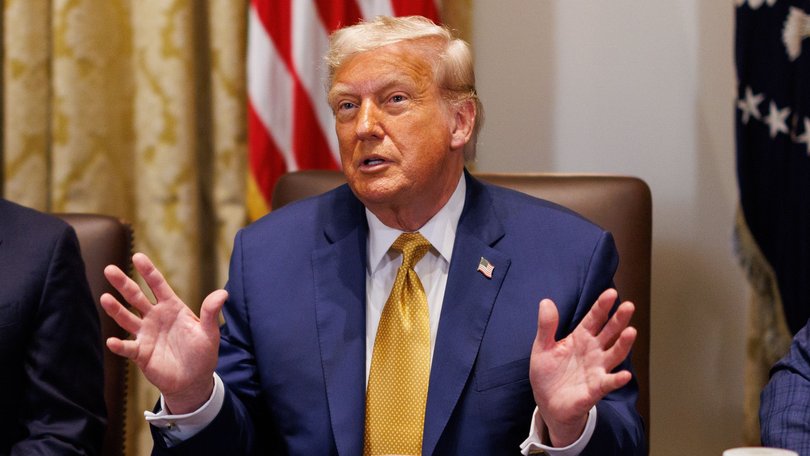Trump announces 30 per cent tariffs on EU and Mexico, starting August 1
President Donald Trump has announced the US will impose a 30 per cent tariff on goods from the European Union and Mexico that will take effect on August 1.

President Donald Trump has announced the US will impose a 30 per cent tariff on goods from the European Union and Mexico that will take effect on August 1.
Mr Trump revealed the new rates in letters to European Commission President Ursula von der Leyen and Mexico’s President Claudia Sheinbaum, which he posted on his social media site Truth Social.
“Mexico has been helping me secure the border, BUT, what Mexico has done, is not enough,” he wrote to Sheinbaum.
Sign up to The Nightly's newsletters.
Get the first look at the digital newspaper, curated daily stories and breaking headlines delivered to your inbox.
By continuing you agree to our Terms and Privacy Policy.Mr Trump said that there will not be tariffs on goods from the EU if the 27-member bloc “or companies within the EU, decide to build or manufacture product[s] within the United States,” he wrote.
He said that if the EU or Mexico retaliates with higher tariffs, “then, whatever the number you choose to raise them by, will be added on to the 30 per cent that we charge”.
The EU was seeking at least a preliminary agreement that would spare it from becoming the latest recipient of a letter from Trump dictating a new, across-the-board tariff on its exports to the U.S.
However, it still received a letter from Trump threatening new tariffs, despite both sides having recently signaled progress in their negotiations after Trump backed off a threat to slap 50 per cent tariffs on the bloc.
The EU collectively sells more to the US than any single country: Total US goods imports from the EU topped USD$553 billion in 2022, according to the Office of the US Trade Representative.
Total US imports from Mexico were approximately USD$454.8 billion in 2022, according to the US Trade Representative.
The two trading partners combined make up roughly one-third of US imports.
“Imposing 30 percent tariffs on EU exports would disrupt essential transatlantic supply chains, to the detriment of businesses, consumers and patients on both sides of the Atlantic,” von der Leyen said in a statement.
She said the EU remains “ready to continue working towards an agreement by August 1.”
“At the same time, we will take all necessary steps to safeguard EU interests, including the adoption of proportionate countermeasures if required.”
The Mexican government said in a Saturday statement that a delegation met Friday with U.S. trade officials “to establish the permanent binational working group that will address the main issues in the relationship.”
They were informed at the meeting that they would receive new tariffs that would begin Aug. 1, according to the statement.
“We stated at the meeting that this was unfair treatment and that we disagreed,” the statement said.
“It is very significant that starting July 11, we established the necessary pathway and forum to resolve any possibility of new tariffs taking effect on August 1,” the statement continued.
Trump has sent similar letters to 23 other U.S. trading partners this week, including Canada, Japan and Brazil, setting blanket tariff rates ranging from 20 per cent up to 50 per cent.
The letters mostly frame the new tariff levels as a necessary part of the Trump administration’s efforts to quickly establish a more “reciprocal” global trade landscape.
Trump had attempted to do that in one fell swoop with his “liberation day” tariff announcement on April 2, when he imposed a nearly global 10 per cent tariff and slapped higher duties on imports from nearly 60 individual countries.
The announcement prompted days of frenzied selling in global markets. Trump put a 90-day pause on nearly all of the higher tariffs a week later.
His trade officials suggested that the US could strike as many as 90 new trade deals during that interval. But by the time the pause was set to expire on Wednesday, the administration had only hashed out preliminary agreements with the United Kingdom and Vietnam.
Treasury Secretary Scott Bessent on Saturday said the UK trade team “smartly secured an early deal.”
“Let this be a lesson to other countries — earnest, good faith negotiations can produce powerful results that benefit both sides of the table, while correcting the imbalances that plague global trade,” Bessent wrote on X.
The trade deal includes a blanket 10 per cent levy on UK goods imported into the US.
Trump on Monday extended his tariff pause until August 1. The tariff rates he set in his recent spate of letters are all scheduled to kick in on the same day.
Trump told NBC News on Thursday that he plans to ratchet up his global tariff baseline rate as high as 20 per cent.
“We’re just going to say all of the remaining countries are going to pay, whether it’s 20 per cent or 15 per cent. We’ll work that out now,” Trump said.
